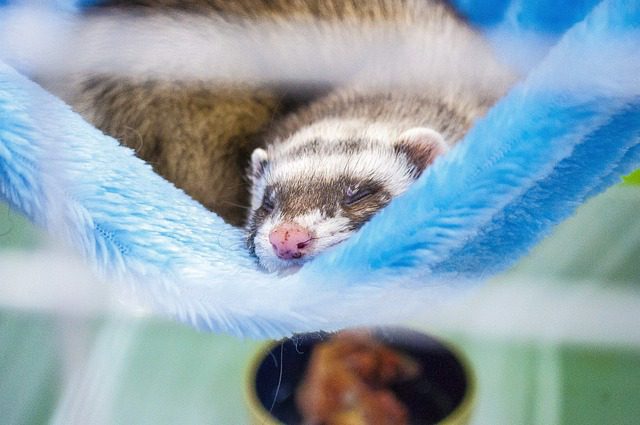11 Potential Ferret Cold Symptoms

Let’s discuss ferret cold symptoms… We all want our furry friends to stay happy and healthy, right?
Well, today let’s talk about our mischievous and adorable little companions, ferrets, and how to spot if they’re feeling under the weather.
In this quick read, we’ll dive into the telltale signs of cold symptoms in ferrets, so you can keep a watchful eye and ensure their well-being.
Ferret Cold Symptoms
When it comes to ferret cold symptoms, keep an eye out for signs such as sneezing, coughing, nasal discharge, and a decrease in appetite or activity levels.
If you notice these symptoms in your furry friend, it’s best to consult a veterinarian for a proper diagnosis and guidance on how to help your ferret feel better.
Remember, early detection and proper care are key to ensuring your ferret’s well-being.
Let’s break it down further…
Here are some of the most common ferret cold symptoms:
1. Fever
When it comes to ferrets, just like humans, a fever is a common symptom of a cold.
Ferrets may experience an elevated body temperature, which indicates that their immune system is actively fighting off an infection.
A normal ferret’s body temperature ranges between 100.5 to 103 degrees Fahrenheit (38 to 39.5 degrees Celsius).
If you suspect your ferret has a fever, it’s crucial to monitor their temperature and consult with a veterinarian for appropriate care and treatment.
2. Sneezing
Sneezing is another common symptom of a cold in ferrets. If you notice your furry friend frequently sneezing, it could be a sign that their respiratory system is irritated or congested due to the cold.
Sneezing helps clear the nasal passages, and while occasional sneezing is normal, persistent or excessive sneezing may indicate a more serious issue.
If your ferret shows prolonged sneezing or other concerning symptoms, it’s best to consult a veterinarian for a proper diagnosis and advice.
3. Runny nose
Similar to humans, ferrets can also experience a runny nose when they have a cold.
You might notice a discharge coming from their nostrils, which can be clear or have a colored tinge, such as yellow or green.
The presence of colored discharge may indicate a possible secondary infection.
It’s important to keep an eye on your ferret’s nasal discharge and inform your veterinarian about any changes or concerns.
4. Coughing
Coughing is another symptom that can occur in ferrets with a cold. It may manifest as a dry, hacking cough or a more productive cough with phlegm.
Coughing in ferrets can be a result of irritation or inflammation in the respiratory system.
If your ferret is experiencing persistent or severe coughing, it’s advisable to consult with a veterinarian for a proper examination and guidance.
5. Lethargy
When ferrets catch a cold, one common symptom they may experience is lethargy.
Lethargy refers to a lack of energy or enthusiasm, where your usually active and playful ferret may appear tired, sluggish, and less interested in their usual activities.
It’s important to keep an eye on your ferret’s behavior and monitor their energy levels closely when they’re exhibiting signs of a cold.
6. Loss of appetite
Another symptom of a cold in ferrets is a loss of appetite. Just like humans, when ferrets are unwell, they may not feel like eating.
If your ferret is experiencing a cold, they might show disinterest in their usual food or even refuse to eat altogether.
It’s crucial to ensure your ferret stays hydrated and offer them easily digestible, tempting foods like chicken baby food or wet cat food to stimulate their appetite.
If the loss of appetite persists or your ferret shows signs of dehydration, it’s advisable to consult a veterinarian.
7. Difficulty breathing
Difficulty breathing is a concerning symptom that could indicate a more severe respiratory issue in ferrets.
If your ferret is wheezing, coughing, or displaying labored breathing, it’s crucial to seek immediate veterinary attention.
Respiratory problems in ferrets can progress rapidly, so it’s important not to delay seeking professional help.
Your veterinarian will be able to diagnose the underlying cause and recommend appropriate treatment options to help your ferret breathe more comfortably.
8. Watery eyes
Watery eyes can occur when a ferret has a cold. You may notice excessive tearing or discharge from your ferret’s eyes, which can make their fur around the eyes appear wet or damp.
This symptom is often accompanied by other cold-related symptoms like sneezing or nasal discharge.
To help alleviate your ferret’s discomfort, you can gently clean their eyes with a saline solution or a damp, clean cloth.
However, if the watery eyes persist or worsen, it’s best to consult a veterinarian for a proper examination and guidance on appropriate treatment.
9. Hiding Behavior
When ferrets are feeling under the weather, one common symptom you may notice is a change in their behavior, particularly hiding behavior.
Ferrets are usually outgoing and curious animals, so if you see your ferret suddenly becoming more withdrawn, spending more time in their hiding spots, or avoiding their usual activities, it could be a sign that they are not feeling well due to a cold.
10. Scruffy Coat
Another symptom of a cold in ferrets is a scruffy or unkempt coat. If you notice that your ferret’s fur looks dull, unkempt, or rough in texture, it may indicate that they are not feeling their best.
Ferrets are typically very clean and groom themselves regularly, so a noticeable decline in their coat’s appearance could be a sign of an underlying health issue such as a cold.
11. Dehydration
Dehydration is a serious concern when a ferret has a cold. Like humans, ferrets can lose fluids through sneezing, nasal discharge, or fever, which can lead to dehydration if not addressed.
Signs of dehydration in ferrets include dry gums, sunken eyes, loss of skin elasticity, and lethargy.
If you suspect that your ferret is dehydrated, it’s crucial to provide them with fresh water and, if necessary, visit a veterinarian for further evaluation and treatment.
Treatment Options For Ferret Cold
Here are some common treatment options for ferret cold:
1. Provide a warm and comfortable environment: Ferrets are sensitive to temperature changes, so it’s essential to keep their living space warm and draft-free. Cold temperatures can worsen their cold symptoms and make them more uncomfortable. Ensure that their enclosure is in a warm area of your home, and provide plenty of soft bedding for them to snuggle up in.
2. Encourage hydration: Hydration is crucial for a ferret’s recovery from a cold. Make sure your ferret has access to fresh water at all times. You can use a water bottle or a shallow dish that they can easily reach. If your ferret is not drinking voluntarily, you can try using a syringe to offer small amounts of water. However, be cautious and consult your veterinarian for guidance on how to administer water via syringe properly.
3. Steam therapy: Steam therapy can help relieve congestion in ferrets. You can create a steamy environment by using a humidifier in the room where your ferret resides. Alternatively, you can place a bowl of hot water in a safe location near their enclosure. This will help to moisten the air and loosen any mucus, making it easier for your ferret to breathe. Always ensure that there is no risk of your ferret coming into direct contact with hot water to prevent burns or accidents.
4. Nutritional support: During a cold, it’s important to provide your ferret with a high-quality diet to support their immune system. Ferrets require a diet rich in animal protein and fat. Consult your veterinarian for recommendations on appropriate ferret food. They may also suggest supplements such as vitamin C or immune-boosting supplements to aid in their recovery. It’s crucial to follow the veterinarian’s advice regarding diet and supplementation.
5. Nasal saline drops: If your ferret is experiencing nasal congestion, nasal saline drops can provide relief. You can purchase saline drops specifically made for small animals from pet stores or consult your veterinarian for recommendations. Administer a few drops into each nostril to help moisten and clear the nasal passages. This can make breathing easier for your ferret. Be sure to follow the instructions provided with the saline drops and avoid using any medications not specifically designed for ferrets.
6. Avoid over-the-counter medications: It’s important to note that many over-the-counter cold medications designed for humans are not safe for ferrets. Medications containing ingredients like acetaminophen or ibuprofen can be toxic to ferrets and may even be fatal. Never administer any medication to your ferret without veterinary guidance. If your ferret’s symptoms are severe or prolonged, consult a veterinarian for appropriate prescription medications.
7. Veterinary consultation: If your ferret’s cold symptoms persist or worsen, it is crucial to seek veterinary care. A veterinarian with experience in treating ferrets will be able to provide a proper diagnosis and prescribe appropriate medications or treatments based on your ferret’s specific condition. They may recommend additional treatments such as antibiotics if a secondary bacterial infection is present or other supportive therapies to aid in your ferret’s recovery.
Read more about the signs of a sick ferret.
Related Questions
What are the common signs of a cold in ferrets?
When ferrets catch a cold, they may exhibit symptoms such as sneezing, coughing, nasal discharge, lethargy, and a decrease in appetite. Keep an eye out for these signs, especially if your ferret has been exposed to other sick animals.
Can ferrets catch colds from humans?
Yes, ferrets are susceptible to certain human respiratory viruses, such as the flu. It’s important to practice good hygiene and avoid exposing your ferret to sick individuals, as they can indeed catch colds from humans.
Should I take my ferret to the vet if I suspect it has a cold?
Yes, it’s advisable to take your ferret to the vet if you suspect it has a cold. Ferrets can deteriorate quickly when they are unwell, so it’s best to seek professional advice to ensure proper treatment.
How can I help my ferret feel better when it has a cold?
You can help your ferret feel better by keeping it warm, providing plenty of fluids, and offering soft, easily digestible food. Additionally, you should try to minimize stress and keep its environment clean to aid recovery.
Can ferret colds be contagious to other pets or humans?
While ferret colds are not typically contagious to humans, they can spread to other ferrets and pets, particularly through close contact. It’s important to isolate the sick ferret and practice good hygiene to prevent the spread of the cold.
Are there any preventive measures to protect my ferret from catching a cold?
To reduce the risk of your ferret catching a cold, ensure its living environment is clean and well-ventilated. Avoid exposing your ferret to sick animals, and keep up with regular veterinary check-ups to monitor its health and immunity.
Conclusion
So there you have it, fellow ferret lovers! Remember, when it comes to cold symptoms in our furry friends, early detection is key. By keeping a close eye on their behavior, providing a warm and cozy environment, and seeking veterinary care if necessary, we can ensure our ferrets stay happy and healthy all year round.

![Why Ferrets Bite [11 Reasons & Remedies] Why Ferrets Bite](https://petcreeks.com/wp-content/uploads/2023/10/ferret-1972523_640.jpg)
![How Do Ferrets Show Affection [12 Easy Signs] How Do Ferrets Show Affection](https://petcreeks.com/wp-content/uploads/2023/10/pexels-evgeniya-litovchenko-9083453.jpg)

![How to Train a Ferret Not to Bite [Helpful Tips] How to Train a Ferret Not to Bite](https://petcreeks.com/wp-content/uploads/2023/12/istockphoto-177817907-612x612-1.jpg)

![Ferret Whimpering [Causes & How To Respond] Ferret Whimpering](https://petcreeks.com/wp-content/uploads/2023/12/ferret-1970169_640.jpg)